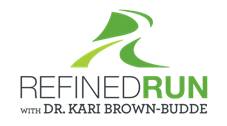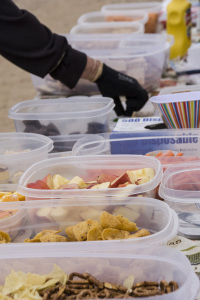What to Eat from 3 Weeks to 30 minutes Before Your Race
Everyone that has been training hard for months before a race has some of the same worries. At the top of that list: FOOD!
In the last three weeks before your race, don’t change your diet drastically. You may feel an excessive hunger during those last few weeks of long runs and while you are tapering for a longer race like the half or full marathon. As you build the mileage and your long runs, continue to replace the calories and energy used through your workouts by eating enough calories so you’re not in a calorie deficit. Now is not the time to focus on losing weight.
On the other hand, after your longest runs are finished and you are starting to taper and cut back on mileage (learn how to perform the best taper for you here), you don’t want to add too much weight and feel sluggish on race day. You won’t need as much food as you did when your mileage was high, so adjust your intake according to how many calories you are expending during exercise and your new, lower mileage. Gaining a couple pounds before race day is pretty common as you decrease mileage and increase rest. That’s ok! It’s better to be completely fueled and a little heavier than under-fueled and without the energy to produce the results you’ve been training for.
Carb Loading
Carbohydrate loading is the method of maximizing your glycogen stores (energy) for improved performance during endurance events longer than 90 minutes. The goal of carb-loading is to delay fatigue and avoid hitting the dreaded “wall” (when you feel like you have no more energy to continue running). Just by tapering your mileage alone, your carbohydrate stores will increase as your muscles will not be using the same amount they were during higher mileage weeks.
If you fuel during a longer race (and you should – read here for more on mid-race fueling), your body can only use a certain amount of carbs ingested per hour. This is not enough to maintain energy and delay fatigue for most people. That is why your diet leading up to the race plays such a large role in your performance and avoiding “the wall”.
If you plan on carb-loading for the big day, plan your higher carbohydrate meals for three to five days before the race – not just the day before. If your race is on Sunday morning, start adding more carbs into your diet on Thursday. This means making sure that you have some carbs at every meal. It doesn’t mean over-indulging in pasta for three days straight. By drawing out your carb-loading meals, you are increasing your body’s fuel (muscle glycogen capacity) that you will need to draw upon on race day.
Everyone has different needs and abilities to carb-load and modify their diet for race day. This is not (of course) a plan for a Paleo Athlete. It’s also not the time to change to being a low-carb athlete.
Generally, an endurance athlete needs between 7 and 10 g of carbohydrates per kilogram of body weight each day, depending on how many hours they spend training. During carb-loading, you may increase your total carbohydrate intake to 75% of your total calories. Keep in mind, carbohydrates include vegetables and fruits, as well as more simple carbohydrates that break down more quickly: pastas and breads. Make sure that you test out carbohydrate loading before a long run and aren’t caught in the porta potty with too much GI distress on race day. You may need to modify how much and what types of carbohydrates you are consuming. To be on the safe side, eat more of your simple carbohydrates closer to the race so your body can break them down more quickly. Make sure the plan works for you as everyone reacts differently.
Caffeine
If you want an added boost on race morning, another variable is modifying your caffeine intake. By abstaining from caffeine (gasp!!) for up to 2-3 weeks (but at least 1 week) before the race and then adding in caffeine on race morning, you can benefit from the performance effects. Another benefit of abstaining from caffeine for a couple weeks before race day is so that you have to listen to your body and rest and sleep more which will also help with your taper and body repair.
In endurance athletes, caffeine prior to an event has been shown to improve performance. By ingesting 3-6mg per kg of your body weight an hour before the race, endurance capability is enhanced. One regular sized mug of coffee is around 60-200mg (depending on the type and size). As caffeine is a diuretic, over-indulging may cause dehydration and GI issues, so drink your cup of coffee with your water and be sure to continue hydrating with water and electrolyte drinks throughout the race.
By ingesting caffeine before endurance exercise, it has also been found to delay your body’s use of glycogen – helping to prolong the carb-loading effects.
Overall, drinking a cup or two of coffee before your race may be an extra bonus of endurance and speed that you can carry with you through the finish line.
Remember that you should never try anything new on race day and only make diet changes based on your specific body and medical conditions.
Good luck during your taper and enjoy every mile!

